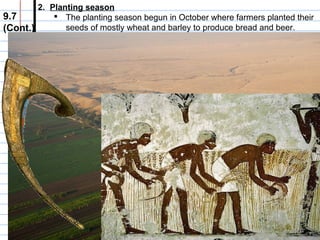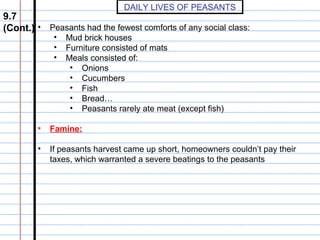Chapter 9.7 peasants
- 1. • Peasants made up the lowest and largest class in Egypt 9.7 • unskilled laborers Peasants • Society depended on peasants to produce the food supply through farming • Also helped build the pyramids THE 3 SEASONS OF THE NILE • Depended on the three seasons of the Nile River: 1. Flooding season  The flooding season lasted from June to September and fertilized the fields, but the farmers worked on building project while they waited for the water to go down. 2. Planting season  The planting season begun in October where farmers planted their seeds of mostly wheat and barley to produce bread and beer.
- 2. 2. Planting season  The planting season begun in October where farmers planted their 9.7 seeds of mostly wheat and barley to produce bread and beer. (Cont.) 3. Harvest season  The Harvest season begun in March where men cut down the plants with Sickles, which were metal blades. Women and children gathered the grain. The workdays were very long during this season. (from dawn to dusk) DAILY LIVES OF PEASANTS • Peasants had the fewest comforts of any social class: • Mud brick houses • Furniture consisted of mats • Meals consisted of: • Onions • Cucumbers • Fish • Bread… • Peasants rarely ate meat (except fish)
- 3. DAILY LIVES OF PEASANTS 9.7 (Cont.) • Peasants had the fewest comforts of any social class: • • • Mud brick houses Furniture consisted of mats Meals consisted of: • Onions • Cucumbers • Fish • Bread… • Peasants rarely ate meat (except fish) • Famine: • If peasants harvest came up short, homeowners couldn’t pay their taxes, which warranted a severe beatings to the peasants



